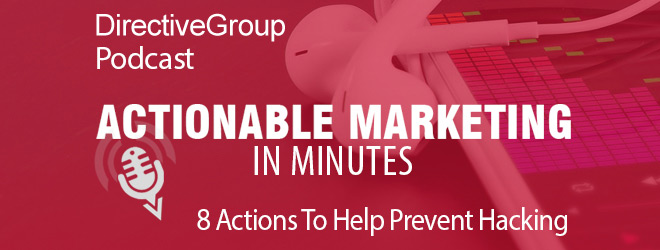In this episode of Actionable Marketing In Minutes we give 8 actions you can take to help prevent hacking.
Use the player below to listen to this episode, or the download link to load it on your device for listening later. You can also find our RSS feed by clicking here, or subscribe by email in the sidebar to the left.
Download our Social Media Marketing Best Practices Guide here!
Not able to listen? Why not read the episode transcript below:
Problem
I hate to be a downer, but I think it’s important to share some pretty alarming statistics in order to illustrate the severity of today’s discussion. Each year, 1 in 5 small businesses fall victim to cybercrime – according to the National Cyber Security Alliance. And, of those, 60% go out of business within 6 months.
Hackers of old have morphed into some pretty major and sophisticated crime syndicates. If they don’t want your information, they very well may use you as a stepping stone or Trojan horse to attack companies you serve.
As you can imagine, the primary breaches are usually due to employee or contractor error, lost or stolen devices or even procedural mistakes.
Solution
At DirectiveGroup, we work hard to keep current with this topic, in an attempt to keep as safe as possible. We know there are many, many ways to stay on the defensive against these menaces – and even a few ways to take the offense. You may want to augment today’s podcast with follow-up research to determine if there are safety measures that might work even better with your unique situation.
For now, we’ve compiled 8 measures you can take today to protect against hacking.
1. Adopt, and put in writing, clear company-wide computer polices.
2. Create a secure password policy – and ensure everyone follows it.
3. Install – and regularly update – anti-malware and anti-virus software on all computers.
4. Perform all hardware and software updates as soon as possible.
5. Allow only routine attachment types to be downloaded. (Absolutely no EXE files!) Train all staff on attachment download safety, explaining that if they accidently download a virus or notice anything suspicious, they are to report the breach immediately.
6. Purchase a business-class router. A firewall is an essential part of this package.
7. Create regular backup files and secure safely – either offsite or if in the cloud, encrypted.
8. If you don’t have a qualified IT professional on staff with the skills to set up a secure network environment, invest in a network security firm or consultancy to assist.
Benefits
The benefits to protecting against hackers goes without speaking. Following the outlined steps should provide you with the necessary security and protection with minimal cash outlay. Remember what Ben Franklin taught us: an ounce of prevention is worth a pound of cure. In this case, that adage really does hold true.
We hope you’ve found this information helpful. Please share it with your networks using hashtag #actionablemarketing. Join us next time as I interview one of my DirectiveGroup colleagues on characteristic traits of great leaders.
Podcast: Play in new window | Download (Duration: 8:44 — ) | Embed
